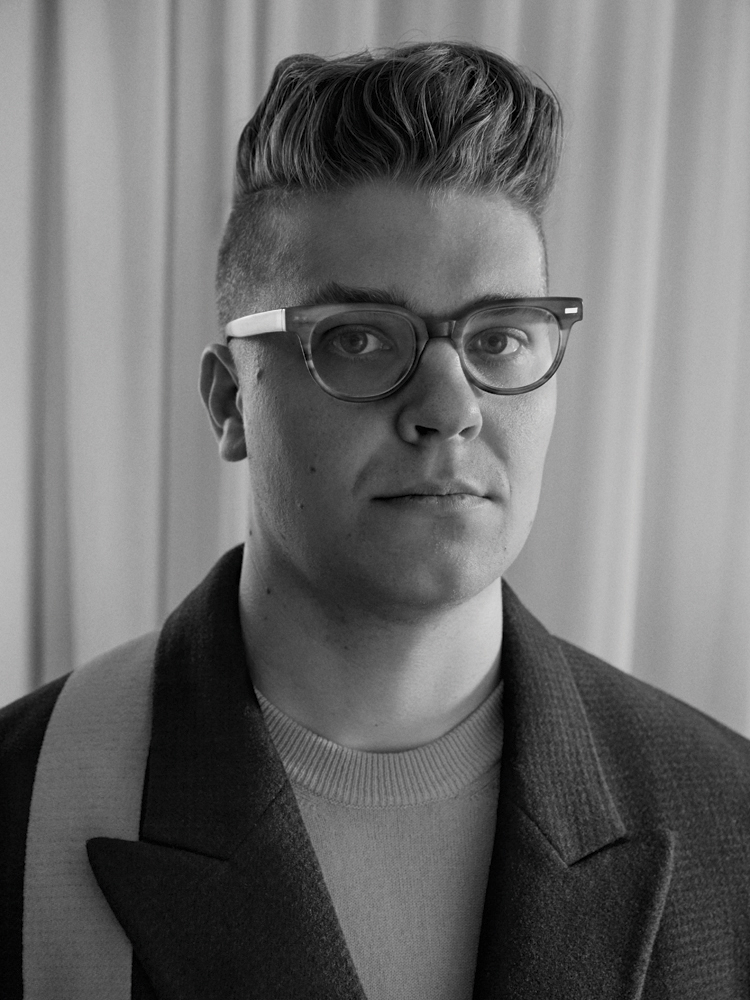Buzzworthy
PRINZE GEORGE IN NEW YORK, JUNE 2016. FROM LEFT: KENNY GRIMM, ISABELLE DE LEON, AND NAOMI ALMQUIST. PHOTOS: HANNAH KHYMYCH. STYLING: SAVANNAH WHITE. HAIR: STEFANO GRECO FOR ORIBE HAIR CARE/BRYAN BANTRY. MAKEUP: ALEX BYRNE FOR BENEFIT COSMETICS/EXCLUSIVE ARTISTS MANAGEMENT. SPECIAL THANKS: DREAM MIDTOWN, THE RICKEY AT DREAM MIDTOWN.
In 2014, Naomi Almquist and Kenny Grimm left New York to return to their hometown in Maryland, where they added Isabelle De Leon to the lineup of their band Prinze George. This month, they release their debut album, Illiterate Synth Pop (Sounds Expansive), which takes its name from a blog post about the band’s breakout sing, “Victor.”
“They reposted the song and it said: ‘illiterate Brooklyn synth-pop,'” Almquist recalls. “They were making fun of the way we spell our name, but we just thought it was funny.”
Almquist and Grimm grew up in Prince George’s County, where they played in various bands and met De Leon when she was attending a college in the area. Now, the trio creates music infused with soft drums, mesmerizing synths, and calming guitar lines layered with Almquists’s hypnotizing vocals that relay stories about identity, love, and loneliness culled from personal experiences. “I used to hide behind my poetry. I’d build a puzzle or a wall,” she says. “It’s not that it wasn’t honest, but it wasn’t clear. On this record, the wall came down.”
Earlier in the summer, we spoke with Almquist, Grimm, and De Leon over the phone.
EMILY MCDERMOTT: Kenny and Naomi, you were in another band before Prinze George. What made you leave and start your own project?
KENNY GRIMM: Our first band was called Kinhead. It was a total rock project. We tried to record an EP the old fashioned way, in a studio, but we were getting a little bit frustrated with that process, so Naomi and I started what is now Prinze George with an electronic track. We could do all the sounds we wanted to hear on the computer. To be able to finish a song in one day is kind of how it started. It was a lot simpler to recreate the sounds in the computer. We fell into this genre and really started to enjoy producing electronics. We have a mix of acoustic and rock influences and we try to keep that feeling in the mixes as well.
MCDERMOTT: What is your songwriting process like? How collaborative is it?
ISABELLE DE LEON: It’s different every time. It was very experimental in the beginning. Kenny and Naomi were writing together and living together, so it was easy for them to lay down new tracks every day. All of us are writers, so we each have our own ideas but also we’ll come together and create something from the bottom up. We’re all multi-instrumentalists, so sometimes Kenny will be playing the drums, sometimes I’ll be doing the drums; sometimes I’ll be doing the keyboards, sometimes Naomi will be doing the keyboards. It’s different every time but it’s cool when the three of us can come together and hash out a few demos.
NAOMI ALMQUIST: We’ve gotten really good at listening to each other and it’s very democratic. Majority rules. If two people are feeling something then we’ll go with that. Everybody does have their corner—I do the lyrics and the vocals, Kenny produces, and Isabelle writes drum parts—but we communicate a lot, check in, and work together to make sure we’re all happy.
GRIMM: For Illiterate Synth Pop, we also went out to Minneapolis and worked with Prince‘s former engineer, Evan Bakke. He has more of a rock and live instrument background, so we approached these electronic tracks but tried to breathe new life into them. Isabelle recorded all the drums part with a live drum set. We wanted to keep that live feel in our process with the hybrid of acoustic and electronic.
MCDERMOTT: Do you plan on expanding the live shows to have a full band?
ALMQUIST: Absolutely! When we get the money we will definitely do that. [laughs] It’s good to work up to that. If you start with a full band, when it’s your first record, there’s nowhere to go. We want it to be solid between the three of us, so when we add it, it feels like there’s been a natural progression.
GRIMM: I think our live shows reflect our studio process and how we are as musicians. I’ll hop from guitar to keyboard, and Isabelle will come out and play keys for a song and then hop back to the drums. We like to keep it free.
MCDERMOTT: You officially became a band in 2013, but you just started releasing things two years ago. How have you seen the process change since then?
ALMQUIST: We’re getting better and faster at writing songs and melodies. It’s more of a cohesive blend. We got a drum pad for Isabelle, which really bridged a sonic gap because she’s a jazz drummer.
DE LEON: We focus on making sure that we write a good song—when you strip it down it’s a good song that can stand alone. For me, as a drummer, it’s easy to get carried away and do flashy things, but in this electronic world it’s understanding the best thing to play to compliment what’s going on in the production. Like Naomi said, we really streamlined our process and have a better understanding of each other’s voices. We know what would be good to compliment what the person is saying, whether it’s in the lyrics or in their instruments and production.
MCDERMOTT: Naomi, I read in an interview that your mother was an opera singer so you had experience with music throughout your childhood. Can you each talk about how you first became interested in music growing up?
ALMQUIST: I’ve been singing since I can remember, but I never saw it as a career until Kenny and I started working together. I never would have had the balls to do this alone and never would have been interested in being a solo pop act. Being in a band is more interesting because there’s much more going on energetically and interpersonally, and that affects the music. And I’m an extrovert. I don’t like to do anything alone. [laughs]
My mom always encouraged me to refine my instrument, but I was very rebellious and thought it was a waste of time. I wanted to have a good time and be a normal teenager. Finally when Kenny and I started writing together, I realized that I had met my match musically and if I didn’t see it through I’d regret it for the rest of my life. And here we are. I’m glad that I trusted my gut.
DE LEON: Music is something I’ve done my entire life. My dad was musical, my grandmother was a pianist, and there was a lot of music in our whole family. I started classical piano lessons when I was four. I started drums when I was seven. I studied both simultaneously for my entire life. I was playing in church, I was playing in school bands, I did state orchestras. My sisters and I had our own pop-rock band. I really started to enjoy it personally and find my own voice when I was about 13; that’s when I started writing music on my own.
By the time I got to college, I knew it was something I wanted to make a career out of. I studied jazz and that was when I started professionally freelancing. Having this communication with people, knowing how it touched me and helped me get through difficult periods of time—I thought [music] was the best way to give back to other people.
GRIMM: I started taking classical piano lessons when I was six or seven. I hated it at the time. I played classical piano for a while and then I heard AC/DC for the first time and I was like, “Electric guitar it is!” I switched to guitar and got a lot of the rock influences. But growing up in the ’90s, you really listen to everything, all these different genres. I was obsessed with Dr. Dre, The Chronic and 2001. This is super embarrassing, but the first “song” that I ever wrote—and this shows you how all over the place [my musical interest] was—was right after The Titanic came out, I was playing “My Heart Will Go On.” I remember rearranging the chords, like, “Oh, this is a new song now!” So going from The Chronic and 2001 to Celine Dion—I don’t think it’s ever stopped.
MCDERMOTT: What was the first song that you wrote on the record, aside from the two singles that were released a while ago?
ALMQUIST: “The Water Main” was the first track we wrote when we moved home to Maryland, because we got bed bugs in two different apartments and that was why we left New York. We lost a lot of money and had to move back in with our folks. It was a shit time. My uncle was also really sick, so it was a lot at once. That was the first song that came out.
When Kenny and I first laid the sketch of “Water Main” down, he turned to me and was like, “This is so great! Isn’t this fun?” and I literally burst into tears. So we do work together but we disappear into our own worlds when we’re creating. He really liked what he had done production-wise and I was so stressed out because writing lyrics and vocals is so draining. It’s a purge. It was two completely different reactions to the same songs because our processes and our jobs are so different. It was a huge learning process for all of us. It’s definitely a very powerful song and hopefully when you listen to it you’ll get that sense of it.
MCDERMOTT: Naomi, when you’re writing lyrics are they always based off of your life or real events, or are any fictional?
ALMQUIST: To date, they’re about real relationships, real experiences that I’ve had or people that I know have had. Kenny and I have a huge social network at home. It’s a bunch of kids that grew up together and have remained friends and have evolved. Some people are stuck, some people are doing well. It’s hard when you get to a point in your life where these people that you’ve grown with are not where you are. You want to connect with them so desperately because it’s habitual, but you can’t. Sometimes you have to love them form afar and writing provides me that therapy, emotionally.
But I think that that’s changing, too. I get bored with the same formula. Sometimes it’s really important to de-self from writing. It’s about you all the fucking time, and I hate reruns, so I can feel my process changing in terms of what I want to talk about and what I want to write about moving forward. It’s getting more complex and meditative instead of so personal. But this record is very, very personal. There’s a lot of raw emotion and real facts in here.
MCDERMOTT: How do you feel exposing so many personal things to the world?
ALMQUIST: Making the decision to do this career-wise was a jump in itself. I’ve decided I’m going to own it, but I do feel nuts every time we play live. I get terrible anxiety. That’s probably why, because they’re my stories. My nerves are a mess. I just try to take it one day at a time.
I think I got into [music] selfishly because I had to get this stuff out, but if you keep writing, it becomes your job and you start to consider your audience. Like, who is listening? Everyone has a different story, had a different education, is coming from a different culture, speaks a different language—at the end of the day what people want is music that is honest and moves them. If you’re too intellectual about it, you’re not going to make the impact or give people what they want when they listen to music, which is to be moved.
ILLITERATE SYNTH POP WILL BE RELEASED AUGUST 5. FOR MORE ON PRINZE GEORGE, VISIT THE BAND’S WEBSITE.







